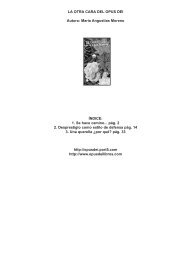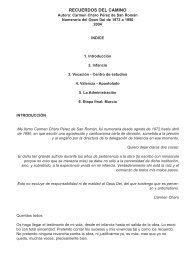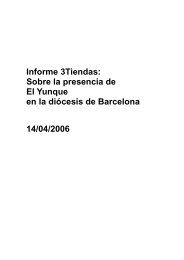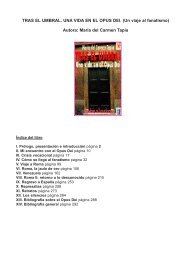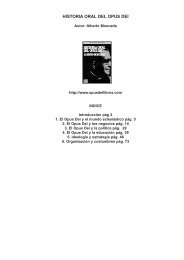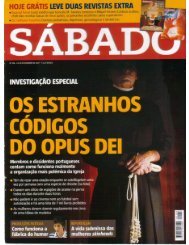Create successful ePaper yourself
Turn your PDF publications into a flip-book with our unique Google optimized e-Paper software.
of turning conversations of personal spiritual direction into information “tools” for government actions—also for control— upon the faithful; and for a peculiar kind of “remote control” spiritual direction.Isn’t all this a manipulation of the individual and a violation of his/her deepest intimacy? With suchmentality, what respect is afforded to the forum of one’s conscience? How and where has the Churchapproved this praxis of the Prelate and Directors of <strong>Opus</strong> <strong>Dei</strong>?But again, like an admission of guilt, the new Experiencias de los Consejos Locales (LocalCouncil’s Experiences) dated as from 2005 have tried to hide such a grave abuse. On the one hand,the entire section previously dedicated to the “fraternal chat” has been rewritten from scratch, ex novo—as I pointed out above in Section 3.2— and all references to the Experiencias sobre el modo dellevar charlas fraternas (Experiences on how to receive fraternal chats) of 2001 have been removed.On the other hand, the separate section dedicated to professional silence in the Vademécum of 2002(pages 14-15) has now been removed, so that its contents are diluted in a new generic discussion aboutthe prudence required in the behavior of the members of local Councils (pages 15–17), but withoutshowing nakedly the institutionalized practices about violation of confidentiality. As it is well-known,the opuslibros.org web site has furnished irrefutable proofs of this fact through the writings andinternal documents of the institution which help understand the methodology behind the praxis.The deceitful attitude shown by the behavior on this matter of the Prelate and the other Directorsin their relation with the Holy See can be easily inferred from an inspection of the Ratio institutionispresented by the Prelatura Sanctae Crucis et Operis <strong>Dei</strong> (Romae 1997) and approved by the RomanCuria. Besides the Statutes of the Prelature, this is practically the only other document that hasbeen examined by Rome. For example, in number 100 of the Ratio institutionis one reads: 10 Ineach Inter-regional Center of Studies there should also be a Spiritual Director, appointed by the Prelatefor five years. Furthermore, there will be a sufficient number of other competent priests, designated bythe Prelate, who will be available for the task of spiritual direction. See also what is said in numbers47–53 for Centers of Studies in general. That is, they are fully aware of the doctrine and the universalcanonical discipline; and they try to induce the Holy See to believe that this is the internal way of actingin the Prelature. However, as one can see, the “secret” internal documents —now called writings onChristian formation for the apostolate— violate in a frontal way this other public document, becausethey describe and teach an entirely opposite praxis (the actual reality). They are internal “customs”ofan obligatory nature which are considered the “spirit” of <strong>Opus</strong> <strong>Dei</strong> transmitted by its Founder.The importance of these (internal) secret writings used by all those holding government positionswithin the institution should not be minimized. As well as the Vademécum del Gobierno Local(Local Government Vademecum) of 2002, the new Experiencias de Consejos Locales (Local Council’sExperiences) of 2005 —in reality of 2006 distributed to <strong>Opus</strong> <strong>Dei</strong> centers during the last quarterof that year— continue saying the following: 11 The documents and writings on Christian formation arenot only meant to help the Directors themselves: they are living, clear doctrine for everybody. Therefore,the local Council members do not just read and meditate them in depth: they also consider how toconvey their contents in classes of formation, personal chats, etc.; and the priests do likewise in theirpreaching. Their permanent study —a grave responsibility for Directors at any level— facilitates keepingin mind the basic criteria and experiences to carry out one’s task with diligence, avoiding omissions,improvisations, or waste of time (pg. 19). Thank God, a good part of these writings have been leakedby faithful of the Prelature for their publication in the opuslibros.org web site; because they have notfound any other way of countering these abuses than that of making such writings widely known.3.4 The explicit prohibition of communicating one’s intimacy10. The matter does not end here. <strong>Opus</strong> <strong>Dei</strong>’s praxis on spiritual direction explicitly forbids the faithfulto manifest their own intimacy to anybody other than the immediate Director or higher Directors.10 The original Spanish text reads as follows: Debe haber también en cada Centro de Estudios Interregional un DirectorEspiritual, que es nombrado por el Prelado para un quinquenio. Además habrá otros sacerdotes idóneos y en númerosuficiente, disponibles para la labor de dirección espiritual, designados por el Prelado. Todos guardarán con el mayorcuidado el debido silencio en todo lo referente al fuero interno.11 The original Spanish text reads as follows: Los documentos y escritos referentes a la formación cristiana, no tienencomo único fin la ayuda a los propios Directores: son doctrina viva y clara para todos. Por eso, los miembros del Consejolocal no se limitan a leerlos y meditarlos a fondo, sino que consideran también cómo transmitir su contenido en clasesde formación, charlas personales, etc.; y lo mismo hacen los sacerdotes en su predicación. Con el estudio permanente—responsabilidad grave para los Directores a cualquier nivel—, se facilita conservar en la memoria los criterios básicos ylas experiencias para desempeñar la propia tarea con esmero, evitando omisiones, improvisaciones, o pérdidas de tiempo(p. 19).7


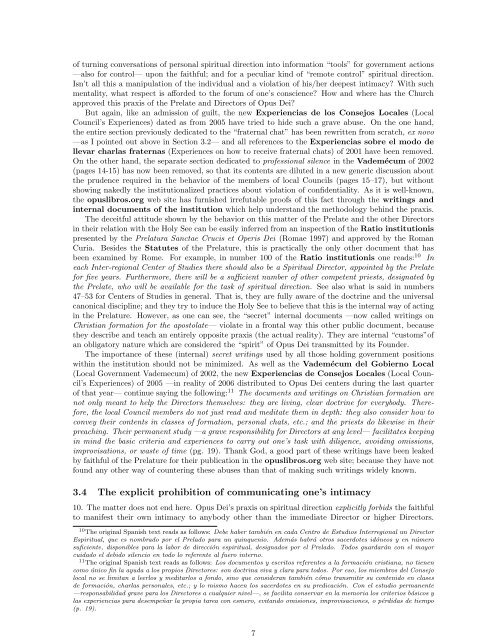
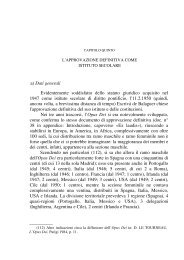
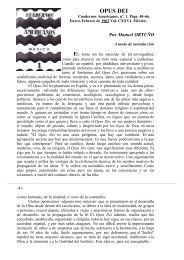
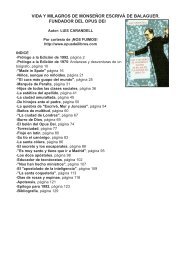
![Opus Dei Anexo A Una Historia [pdf].](https://img.yumpu.com/14295645/1/184x260/opus-dei-anexo-a-una-historia-pdf.jpg?quality=85)
